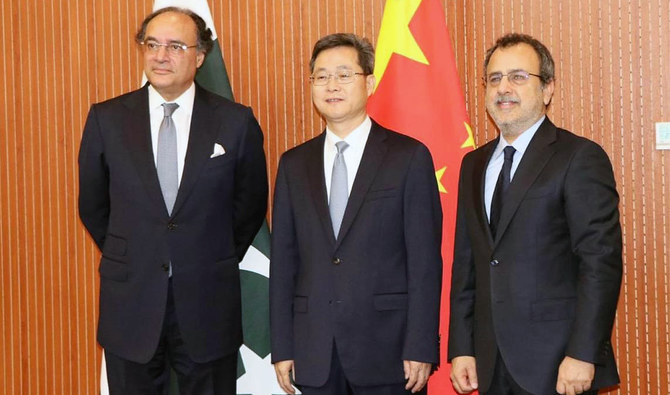By Staff Reporter
ISLAMABAD: Pakistan’s Finance Minister Muhammad Aurangzeb arrived in Beijing on Thursday to discuss power sector structural reforms suggested by the International Monetary Fund (IMF) with his Chinese counterpart, local media reported on Friday.
Aurangzeb, accompanied by Power Minister Awais Leghari, is leading a delegation to negotiate several proposals, including the reprofiling of nearly $15 billion in energy sector debt. The talks come as Pakistan implements reforms to reduce “circular debt” in the power sector, which has been plagued by high rates of power theft and distribution losses.
The visit follows a $7 billion IMF bailout agreed upon earlier this month, which included raising power tariffs as part of the funding program. China, a longtime ally, has provided critical financial support to Pakistan, including setting up over $20 billion worth of planned energy projects.
The finance minister met with Chinese Minister for Finance Lan Fo’an and discussed Pakistan’s economic reform agenda, including efforts to strengthen tax revenue generation and achieve sustainable growth. The Chinese side assured continued support for Pakistan’s economic development, including through a high-quality development agenda.
Aurangzeb and Leghari also met with the President of China Export and Credit Insurance Corp (SINOSURE) to discuss the latest reform agenda and expressed confidence in SINOSURE’s continued support for completing ongoing and new projects under the second phase of the China-Pakistan Economic Corridor (CPEC).
China’s insurance company, Sinosure, has expressed willingness to implement the 700 MW Azad Pattan Hydropower Project and 1,124 MW Kohala Hydropower project, worth billions of dollars.
Local media reported that Aurangzeb and Leghari’s talks focused on the issuance of Panda Bonds, re-profiling of loans, and conversion of imported coal power plants to Thar coal.
Pakistan aims to raise $300 million through Panda Bonds, which could be increased to $700-750 million.
The ministers briefed their Chinese counterparts on Pakistan’s efforts to introduce tax and energy reforms, and both sides exchanged views on strengthening bilateral economic cooperation, including financial and banking cooperation.
The talks come as Pakistan seeks to address its economic challenges, including a heavy debt burden and power sector losses. The International Monetary Fund (IMF) has suggested reforms to reduce “circular debt” in the power sector, which has plagued Pakistan’s economy.
The two countries also discussed expanding the China-Pakistan Economic Corridor (CPEC) and the role of the private sector in its next phase. China has invested over $20 billion in planned energy projects in Pakistan.
Copyright © 2021 Independent Pakistan | All rights reserved




